Echinacea Exploration---Why it is popular in Europe and USA
Echinacea Exploration-----Why it is popular in Europe and America
Edit by Yongyuan Bio Kiki 20210108
Yongyuan Bio Echinacea Extract
With high-quality raw materials, mature production technology, and a strong willing to produce (first-grade Echinacea Extract, )Yongyuan Bio always guarantees products quality.
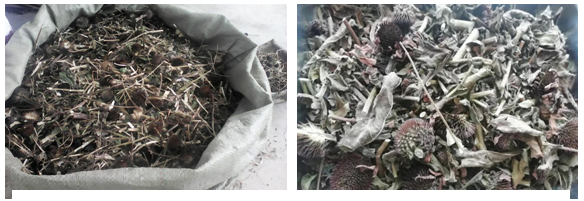 1.Specifications
1.Specifications
|
Product Name |
Botanical Source |
Spec |
Test Method |
Application |
Echinacea Extract
|
Echinacea Purpurea |
Polyphenols 4% 7% |
UV |
Supplement, Poultry, Fishing |
|
Polyphenols 4% USP40 |
HPLC |
Supplemnt |
|
Chicoric Acid 1% |
HPLC |
Supplement, Breeding industry |
|
Chicoric Acid 2% |
HPLC |
Supplemnt |
|
Chicoric Acid 4% |
HPLC |
Supplemnt |
|
Echinacosides 4% |
HPLC |
Supplemnt |
|
NON-GMO, NON-IRRIDIATION, Comply with EC396/2006 EU food and feed pesticide residue limit standard. |
2.Flowchart
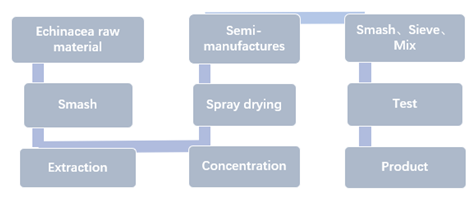
What Echinacea is?
Echinacea is a perennial herb of the Asteraceae family. Echinacea species that have been more studied and more widely used include E. purpurea (Echinacea purpurea), E. angustifolia (Echinacea narrow-leaved), E. pallida (Echinacea white) and other three species, among which E. purpurea (Echinacea purpurea) is the most commonly used and occupies about 80% of the market.
Echinacea has a long history of use in Europe and the United States, and is one of the longest-standing botanicals and health supplements in the West. Since the 19th century, Echinacea has been a popular herb in Europe and the United States. In the health food market, Echinacea has become one of the best-selling herbal health food since 1996.
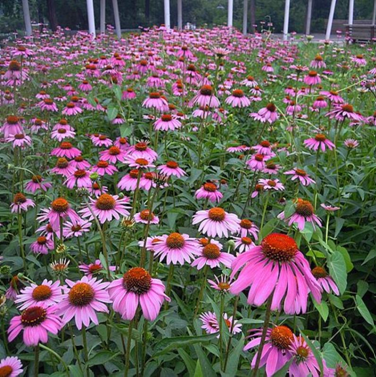
In 1870, Echinacea entered the mainstream phytotherapeutic field in the United States, and Echinacea reagents began to be widely used for various therapeutic purposes. Since then, Echinacea has become the national legal botanical medicine and the most widely used botanical health medicine in the United States.
Echinacea was successfully introduced to Europe in the 1930s. In the 1950s, Germany conducted extensive research on the chemical composition of Echinacea, and many phytochemicals were first isolated and purified from the extract of Echinacea.
Echinacea is one of the very few plants that have been experimentally proven to modulate immunity, and since the 1990s it has become the most widely used anti-infective botanical health remedy in continental Europe.
Here comes a question. Why is Echinacea still so popular as a herb in today's world with such advanced chemical, biopharmaceutical and genetic technologies? Is it irreplaceable?
To address the issue of anti-inflammation, if there are good antibiotics, then botanicals with anti-inflammatory effects will be replaced, but currently there is no good solution for viruses, regardless of chemical pharmaceuticals, biopharmaceuticals, or genetic technology.
Experts believe that Echinacea and
Astragalus (
Astragalus Extract )are currently the two best botanicals recognized worldwide for their antiviral properties with no side effects, and Echinacea is by far the most effective herb for the prevention and treatment of influenza. So
it is certainly irreplaceable.
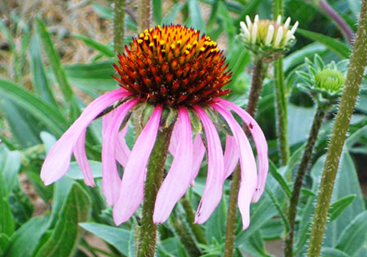
In China, whenever the seasons change and colds become popular, botanicals such as
Radix isatidis (
Radix isatidis Extract )and
Honeysuckle (
Honeysuckle Extract )are always in demand and even in short supply. In the western countries,
Echinacea is the botanical that most families need to prevent colds and flu. That’s why echinacea is also known as the "Western Radix Isatidis ".
Echinacea has similar anti-influenza virus and immune-enhancing effects as Radix Isatidis, and is widely used to prevent and treat viral respiratory infections. According to the literature, the leaves or roots of Echinacea were used more than 1,000 years ago to make an infusion to treat coughs and sore throats. Echinacea extract has a significant laxative and analgesic effect, and can be held in the mouth to stimulate saliva secretion and moisten the throat to facilitate local immunity.
Both the root and the above-ground parts of
Echinacea are listed in the U.S. Pharmacopoeia, and evaluations in the European Union recognize its use for skin diseases and minor wounds and for coughs and colds. In Germany, who is known for its strict and cautious use,
Echinacea has become one of the most widely used hospital botanicals, mainly for the treatment and prevention of infections caused by various pathogens.
A study published in a prestigious British medical journal reported that echinacea is more effective than people thought in boosting immunity, and it can even prevent colds. For this reason, a doctor at the University of Connecticut School of Pharmacy did a study showing that patients who ingested
echinacea could reduce the incidence of worsening colds by 58% and shorten the duration of colds by 1.5 days.
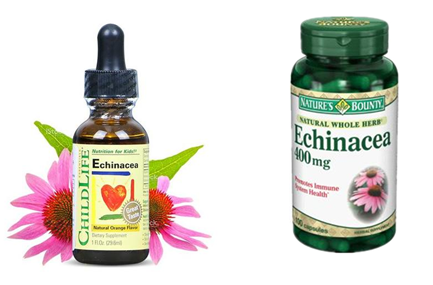
More than 70 substances have been isolated, The most important ones include phenolic acids, caffeic acid derivatives, polyacetylenes, polysaccharides, glycoproteins, and alkylamides.
These important components have been proven in many biochemical, animal tests and human experiments that Echinacea has
activities such as promoting immune cell responses in the body, promoting the production of immune endogenous substances in the immune system, increasing phagocytosis, stimulating the production of natural killer cells, and increasing the concentration of lymphocyte ratios. Because of these characteristics, echinacea is often used for the relief of cold and flu symptoms.
What’s more,
Echinacea purpurea is an excellent immune promoter and immunomodulator. In recent years, immunotherapy has received medical attention, and the development of immune-promoting, immunomodulating and immunosuppressive agents from natural herbs is one of the important directions. It is in this context that Echinacea has become a popular immune promoter and immunomodulator in the international arena.
In 1999, the World Health Organization published a report on the efficacy of the above-ground parts of Echinacea at full bloom; in 2000, the European Cooperation for Scientific Research in Phytotherapy (ESCOP) published a report on the efficacy of the above-ground parts of Echinacea in raw and concocted form at appropriate doses; and Canada has officially included Echinacea infusions and decoctions in traditional herbal medicine for the treatment of sore throats and other illnesses caused by colds.




